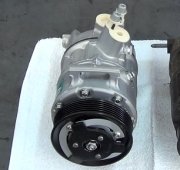What could lead reading, because I was kind of expecting low 200's on all cylinders.
Xx Excessive carbons will raise the engine compression
Also during the compression test, I removed all the spark plugs prior to testing the FIRST cylinder or do I just remove the spark plug to the cylinder I'm testing and leave the 3 remaining in UNTIL THEY'RE TESTED?
Xx Remove all the plugs and block wide open the throttle plate.
IS IT THE RINGS OR THE VALVES?
If compression is low in one or more cylinders, you can isolate the problem to the valves or rings by squirting a little 30 weight motor oil into the cylinder through the spark plug hole and repeating the compression test. The oil temporarily seals the rings.
If the compression readings are higher the second time around, it means the rings and/or cylinder is worn. No change in the compression readings would tell you the cylinder has a bad valve.
A leakdown or cylinder leakage test is similar to a compression test in that it tells you how well your engine's cylinders are sealing. But instead of measuring pressure, it measures pressure loss.
A leak down test requires the removal of all the spark plugs. The crankshaft is then turned so that each piston is at top dead center (both valves closed) when each cylinder is tested. Most people start with cylinder number one and follow the engine's firing order.
A threaded coupling attached to a leakage gauge is screwed into a spark plug hole. Compressed air (80 to 90 psi) is then fed into the cylinder.
An engine is great condition should generally show only 5 to 10% leakage. An engine that's still in pretty good condition may show up to 20% leakage. But more than 30% leakage indicates trouble.
The neat thing about a leakage test (as opposed to a compression test) is that it's faster and easier to figure out where the pressure is going. If you hear air coming out of the tailpipe, it indicates a leaky exhaust valve. Air coming out of the throttle body or carburetor would point to a leaky intake valve. Air coming out of the breather vent or PCV valve fitting would tell you the rings and/or cylinders are worn.
A leakage test can also be used in conjunction with a compression test to diagnose other kinds of problems.
A cylinder that has poor compression but minimal leakage usually has a valvetrain problem such as a worn cam lobe, broken valve spring, collapsed lifter, bent push rod, etc.
If all the cylinders have low compression but show minimal leakage, the most likely cause is incorrect valve timing. The timing belt or chain may be off a notch or two.
If compression is good and leakage is minimal, but a cylinder is misfiring or shows up weak in a power balance test, it indicates a fuel delivery (bad injector) or ignition problem (fouled spark plug or bad plug wire
Sunday, April 19th, 2009 AT 6:31 PM



